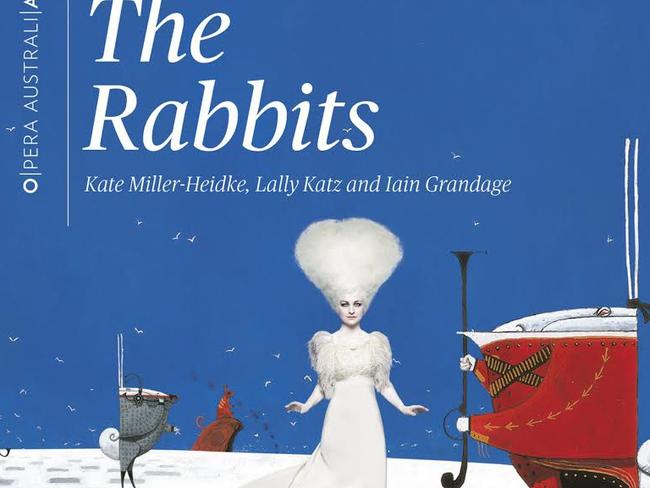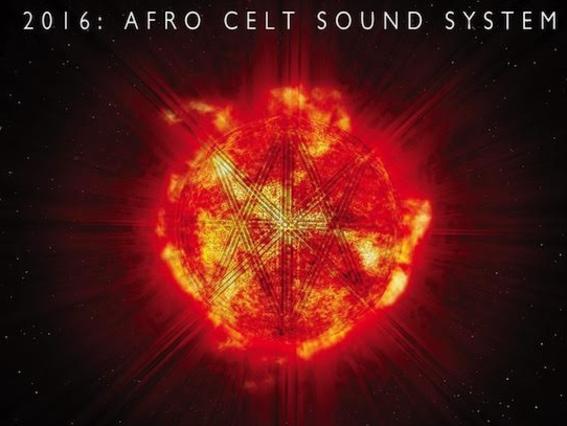Reviews: Kate Miller-Heidke; Afro Celt; Francesca Prihasti; L-Fresh
Hop, hop, hooray! It’s here, at last. The Rabbits, which charmed audiences and won four Helpmann Awards last year.
OPERA
The Rabbits
Kate Miller-Heidke, Lally Katz and Iain Grandage
ABC Classics
4.5 stars

Hop, hop, hooray! It’s here, at last. The music-theatre piece that charmed audiences at the Perth, Melbourne and Sydney festivals and took four Helpmann Awards last year has emerged from its warren. Parents throughout this country have long been grateful for the haunting children’s book by John Marsden with illustrations by Shaun Tan. All hail Opera Australia’s chief Lyndon Terracini for the inspired idea of transforming a vexed tale of colonisation and displacement into a family opera. A stellar creative crew was brought together by theatre director John Sheedy, who adapted the book. Lally Katz created the libretto for gorgeously attractive new music by Kate Miller-Heidke, assisted by the inimitable orchestral strokes of Iain Grandage. This recording was made before a Sydney Festival live audience in January 2015 and is supplemented by a five-minute excerpt performed by Miller-Heidke and Grandage, destined to be a hit tune that will live on the concert platform too. Despite the sprawling scope of the work’s subject matter, these rabbits and marsupials are a modestly sized family, comprising 12 singer-actors and a band half that number. Michael Halliwell’s insightful booklet notes struggle to find a place for The Rabbits in the recent lineage of Australian opera and music theatre. It’s likely that Miller-Heidke and crew have never heard of Albert Arlen or perhaps even the Wesley-Smith twins whose Boojum! titillated an Adelaide Festival three decades ago. Yes, The Rabbits advances a tradition of tuneful explorations of Australian identity that is barely acknowledged today. The music scurries along a warren of influences, elevated Gilbert and Sullivan, Satie-fied circus music, mesmeric Sondheim, coruscating John Adams and a few numbers of foot-tapping funk. Many of this recording’s 15 tracks feature the stratospheric trilling of Miller-Heidke, an operatically trained singer who moves easily between Brisbane’s Topology and the Metropolitan Opera’s recent revival of Adams’s The Death of Klinghoffer. Alongside her commanding narrator-like performance as Bird, there are outstanding performances from a number of rabbits, notably Kanen Breen as a scientist who spends much of the hour-long work singing in falsetto. Among the marsupials, Marcus Corowa and David Leha contribute moving performances as the original inhabitants of an ancient land suddenly dealing with the arrival of a strange species, the rabbits. (Words such as invasion and reconciliation, though on the tip of many lizardly silvertongues, are studiously avoided; these issues are addressed in the CD booklet.) In effect, The Rabbits is a moving allegory of a dimension of Australian history that is not easily explained to children. Is there a better introduction to a discussion around the family table of this issue? Polemics aside, this is a beguiling hour of fun that rewards repeated listening and reflection.
Vincent Plush
*

JAZZ
Evolving
Francesca Prihasti
Independent
3.5 stars
Indonesian born, Sydney-based pianist Francesca Prihasti has released her second album, featuring a quartet, recorded in New York. The seven tracks are all Prihasti originals, which she says express the story of a butterfly and its evolution from the egg and caterpillar to adulthood.
The opener, Summer Sky, begins softly with a repetitive piano note suggested as signifying tiny butterfly eggs laid on leaves. As the inchoate piece continues, Nic Vardanega’s guitar states the theme as Orlando le Fleming’s bass and Rodney Green on drums join in unobtrusively and the piano embarks on flowing, lyrical improvisations, building to an ensemble crescendo.
The bass, piano and guitar ostinatos at the start of The Circle serve to signify that all things move in cycles and, characteristically, Prihasti’s sprightly solo glides with imaginative melodic ideas that are picked up and further expanded by the guitar’s spirited solo, ahead of a concluding, cyclic return to the opening passages.
Continuing the collection’s dreamily poetic atmosphere, Safe Distance opens with a slow-moving piano and guitar theme that moves in an upward trajectory and introduces a thoughtful bass solo, while the title track establishes a tuneful melody interweaving piano and bass, soon joined by guitar moving into a pleasantly relaxed solo.
This is an album of romantic music that floats and drifts idyllically with light rhythms and melodious concepts, following the composer’s narrative ideas. It’s expressively played, and the overall effect is one of agreeable harmoniousness.
John McBeath
*

WORLD/FOLK
The Source
Afro Celt Sound System
ECC/Planet
4.5 stars
The excessive wait for an album of fresh material from the Afro Celt Sound System, prolonged by what appears to be an irreconcilable schism between band personnel, has exasperated fans. Their frustration has been relieved by the release of a 20th-anniversary offering — the first studio recording under the collective moniker since 2005’s 10th birthday album, Anatomic. Further cause for optimism comes with reports that it’ll be followed soon by a counter-release from the breakaway Afro Celts, led by several original members. If Born is half as good as The Source, long-time followers should be ecstatic. Founder Simon Emmerson’s decision to augment his core band with a stellar guest list has more than offset the absence of the aforementioned players. The resident West African section of djembe/talking drum and kora/balafon virtuosos has been consolidated with a Guinean female vocal quintet. The Irish component of the Celtic part of the equation is expanded via cameos from three distinguished uillean pipers/whistle players and a gun fiddler. Members of Shooglenifty boost the Scottish presence, along with an eight-piece female Glaswegian choral group and a new resident bagpiper cum Gaelic rapper, Griogair Labhruidh. Johnny Kalsi’s dynamic dhol drumming continues to add Indian spice to the mix. If the arranging is a tad unbalanced on the opening three tracks, producer Emmerson’s deployment of this not inconsiderable firepower is spot on thereafter. All elements combine magnificently in the meditative, moody and multi-phased Where Two Rivers Meet and the suitably climactic finale, Kalsi Breakbeat. The Afro Celt Sound System’s most expansive album to date retains the band’s renowned energy while tapping fresh creative inspiration.
Tony Hillier
*

HIP HOP
Become
L-FRESH the LION
Elefant Traks
4 stars
If you think about one version of postcolonial Australia, it could be this: someone who’s the local-born product of migrant parents, striving for self-betterment as well as looking to give back to society; carrying their own stories and religious traditions but finding ways of fitting these into the new world, all the while acknowledging the indigenous one that’s been displaced.
The best examples of this look simultaneously to the chaos of the past and the hope of the future, bringing elements of both to the present.
Sukhdeep Singh, whose Sikh parents arrived in Australia in the 1980s, is one such thread in this social tapestry.
Singh grew up in southwestern Sydney and went on to become two things of equal note: a lawyer with a deep commitment to refugee and migrant issues, and a vibrantly sophisticated hip-hop artist known as L-FRESH the LION.
As the former, he brings a practical understanding to complex social issues. As the latter, he’s informed by all that experience, but he’s also just deep in the groove, “an entertainer, but to me this is so much more than music”, as he raps on Be Cool.
Don’t be fooled by the “more than music” line, though; the technical assuredness of Become is beguiling, from the super cool-jazz intro to Pray for Me to the soaring pain of Elefant Traks labelmate Jimblah on unBecome, from the traditional instrumentation and musical scales on Panjab: An Introduction (“Let me take you to the land of both my mother and my father / where life is so hard but the people work harder”) to the shout-out gospel chorus of Black and White, the infectious almost six-minute album closer that apparently began life as a 2am voicemail message.
Stephen Fitzpatrick


